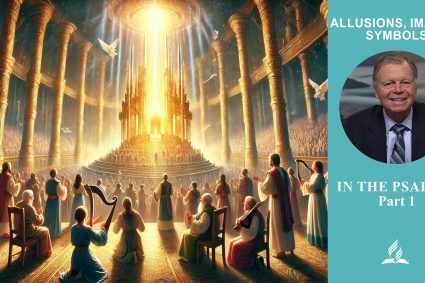
Series PSALMS with Pastor Mark Finley |
Lesson 5.Singing the Lord’s Song in a Strange Land |
In the captivating Lesson 5, various Psalms are examined that delve into existential themes such as suffering, illness, the apparent absence of God, and the challenges posed by the prosperity of the wicked. The authors lament the destruction of Jerusalem, personal struggles on the brink of death, profound suffering in the perceived absence of God, and the seeming inconsistency of divine promises. Despite these challenges, the Psalms emphasize faith in God’s sovereignty and the necessity of communication with God amid adversity and trials.
Memory Text: Psalm 137:4 – “How shall we sing the Lord’s song in a strange land?”
Content:
5.1 The Days of Evil
The Psalms reflect the theological struggle between good and evil. The destruction of Jerusalem is considered a divine scandal, giving the heathens a reason to blaspheme God. The Psalmist acknowledges that the sins of the people have damaged their relationship with God and emphasizes the need for God’s merciful intervention to restore the covenant. Defending the character of God in the world is crucial, as only through the salvation of His people is His name justified and praised. This principle holds true today, as our actions influence not only ourselves but also the God we profess.
5.2 At Death’s Door
Psalms such as 41, 88, and 102 convey intense prayers for deliverance from illness and death. The Psalmist describes physical weakness, social isolation, and existential despair. Some Psalms recognize that innocent suffering can be part of life, while others point to the connection between sin and illness. Despite accusations against God, the Psalms cling to a deep faith that holds onto God’s love and redemption even in challenging times. These texts emphasize that God’s sovereignty over suffering and redemption provides hope, especially when viewed in the light of the suffering of Christ.
5.3 Where is God?
Psalms like 42, 63, 69, and 102 bear witness to the deep sorrow of the Psalmist due to the apparent absence of God. The isolation from God is felt as thirst in a dry land and a fear of death. The Psalmist feels alienated and compares themselves to lonely birds. Nevertheless, the Psalmists choose not to remain silent in the face of God’s silence. Their faith in prayer remains unshaken, knowing that God, though seemingly absent, is still the living and gracious God. The Psalms teach that communication with God must continue amid trials, as God will not remain silent forever.
5.4 Has His Promise Failed Forevermore?
Psalm 77 depicts the emotional rollercoaster of the Psalmist, who calls out to God in deep sorrow. The remembrance of God’s past actions evokes not only comfort but also questions about whether God has changed or might break His covenant. The apparent absence of God leads to sleepless nights, yet the Psalmist overcomes this phase, realizing that God’s assurances are not in explanations but in the confirmation of His faithfulness. The Psalmist’s conclusion emphasizes the mysterious and sovereign ways of God, often incomprehensible to human eyes.
5.5 Lest the Righteous Be Tempted
Psalms, including 37, 49, 94, and 125, deal with the prosperity of the wicked and the difficulties it poses for the righteous. The wicked thrive, despise God, and oppress others, creating a perplexing problem for the Psalmist. Psalm 73 focuses on the injustices of the world, but the Psalmist finds comfort when led to the sanctuary, recognizing that God’s sovereign rule changes the perspective on the end times. The Psalms teach that spiritual insight and trust in God’s sovereign plan are necessary to overcome the challenges of the world.
5.6 Summary
In Lesson 5, various Psalms are explored, addressing existential themes such as suffering, illness, the apparent absence of God, and the challenge of the prosperity of the wicked. The authors of the Psalms lament the destruction of Jerusalem, personal struggles on the brink of death, deep suffering in the perceived absence of God, and the apparent inconsistency of God’s promises. Despite these challenges, faith in God’s sovereignty and the necessity of communication with God amid suffering and trials remain.
(Visited 25 times, 1 visits today)




















